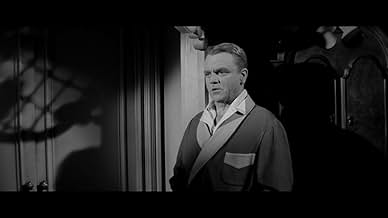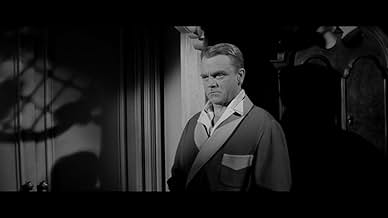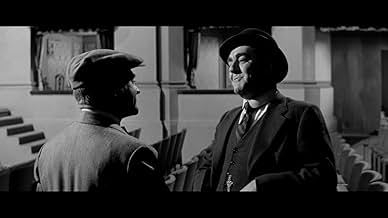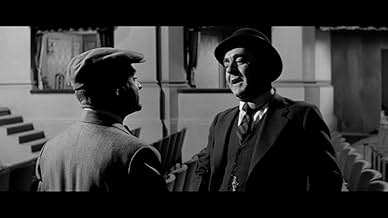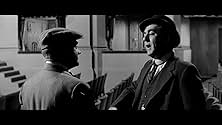IMDb RATING
7.1/10
3.1K
YOUR RATING
The life and career of vaudevillian and silent-screen horror star Lon Chaney, including his contentious relationship with his neurotic wife and his premature death.The life and career of vaudevillian and silent-screen horror star Lon Chaney, including his contentious relationship with his neurotic wife and his premature death.The life and career of vaudevillian and silent-screen horror star Lon Chaney, including his contentious relationship with his neurotic wife and his premature death.
- Nominated for 1 Oscar
- 1 win & 1 nomination total
Robert Evans
- Irving Thalberg
- (as Robert J. Evans)
Philip Van Zandt
- George Loane Tucker
- (as Phil Van Zandt)
7.13.1K
1
2
3
4
5
6
7
8
9
10
Featured reviews
Only for die hard Cagney fans.
1957 bio-pic on the life of silent film legend Lon Chaney,this overlong and poorly written film has only the central performance of James Cagney as the title character to recommend it. Nearing the end of his long and distinguished career, Cagney was already 10 years older than Chaney was when he died when filming began and is hardly convincing as a young and struggling vaudevillian and new father. Things improve when Chaney goes to Hollywood where the screenplay deals with his success as a character actor and his near miraculous ability to transform his face and body as necessary to play what became an amazing range of exotic and tortured characters.
Unfortunately the writers choose to concentrate the bulk of the film on Chaney's family problems. Chaney's parents were deaf mutes, which apparently accounted for their son's out-sized gift for pantomime. But the screenplay treats deafness as if it were the plague, something so embarrassing that Lon cannot bring himself to tell his pregnant wife (played by Dorothy Malone) that his parents are deaf. When she discovers the truth, she reacts in an absurdly hysterical tantrum, even threatening (in a veiled sense, of course, after all this is 1957) to have an abortion rather than risk the possibility of giving birth to a deaf child.
The Malone character is scapegoated throughout the film, becoming the screenplay's surrogate for society's prejudice towards the deaf, and later being punished for wanting her own career. Even though she eventually becomes a sympathetic character, the script comes down strongly in favor of Chaney's second wife, who dutifully gives up her own show business career to become the stay-at-home wife and step-mother to Chaney's young son.
Jim Backus does his best in the role of Chaney's friend/press agent to keep from being a walking cliché while forced to utter lines like " 'Mystery' did you say? That's it! We'll call him 'Lon Chaney, Man of Mystery!' " and " How many faces did you say? That's it! We'll call him 'Lon Chaney, Man of a Thousand Faces!' " Jane Greer gives up her usual femme fatale persona to play Lon's devoted second wife, and a very young Roger Smith plays son Creighton (later to become Lon Chaney, Jr.), hoping to follow in his father's footsteps. The sodden direction by Joseph Pevney precludes any mystery as to how this story will resolve itself.
Only the performance of James Cagney makes this film worth watching, even as the script wallows in Hollywood kitsch and repellent 50s attitudes towards women and the handicapped. John Bills
Unfortunately the writers choose to concentrate the bulk of the film on Chaney's family problems. Chaney's parents were deaf mutes, which apparently accounted for their son's out-sized gift for pantomime. But the screenplay treats deafness as if it were the plague, something so embarrassing that Lon cannot bring himself to tell his pregnant wife (played by Dorothy Malone) that his parents are deaf. When she discovers the truth, she reacts in an absurdly hysterical tantrum, even threatening (in a veiled sense, of course, after all this is 1957) to have an abortion rather than risk the possibility of giving birth to a deaf child.
The Malone character is scapegoated throughout the film, becoming the screenplay's surrogate for society's prejudice towards the deaf, and later being punished for wanting her own career. Even though she eventually becomes a sympathetic character, the script comes down strongly in favor of Chaney's second wife, who dutifully gives up her own show business career to become the stay-at-home wife and step-mother to Chaney's young son.
Jim Backus does his best in the role of Chaney's friend/press agent to keep from being a walking cliché while forced to utter lines like " 'Mystery' did you say? That's it! We'll call him 'Lon Chaney, Man of Mystery!' " and " How many faces did you say? That's it! We'll call him 'Lon Chaney, Man of a Thousand Faces!' " Jane Greer gives up her usual femme fatale persona to play Lon's devoted second wife, and a very young Roger Smith plays son Creighton (later to become Lon Chaney, Jr.), hoping to follow in his father's footsteps. The sodden direction by Joseph Pevney precludes any mystery as to how this story will resolve itself.
Only the performance of James Cagney makes this film worth watching, even as the script wallows in Hollywood kitsch and repellent 50s attitudes towards women and the handicapped. John Bills
Above average of its type
This picture distinguishes itself from the all-too-familiar reverential and sentimental quasi-biographies of show business legends by emphasizing the complex relationship between Lon Chaney and his first wife, Cleva Creighton, and by treating their problems in an even-handed manner. She emerges as flawed and difficult to deal with - but so does he. Their child is caught in the middle.
The story would be of interest even if it did not concern a famous person. Chaney's career provides a colorful background to an essentially human drama, one which may present its characters too often as one-dimensional prototypes lacking depth or subtlety, but is nevertheless a drama which (except for the maudlin deathbed scene) effectively develops the genuine emotional conflicts at its core. In a solid cast, Dorothy Malone, as Cleva, is most notable.
The story would be of interest even if it did not concern a famous person. Chaney's career provides a colorful background to an essentially human drama, one which may present its characters too often as one-dimensional prototypes lacking depth or subtlety, but is nevertheless a drama which (except for the maudlin deathbed scene) effectively develops the genuine emotional conflicts at its core. In a solid cast, Dorothy Malone, as Cleva, is most notable.
At times rather inaccurate but still entertaining.
"Loosely based....". When I hear this about a bio-pic, it is a complete turnoff to me. I think some it was because I was a history teacher--and to me, history is sacred--you tell it exactly like it was. Yet, in so many Hollywood films, the truth isn't deemed interesting enough and they heavily embellish the picture. Thus is the story of Lon Chaney in "The Man of a Thousand Faces". While the main points are correct, Chaney's interesting life just wasn't interesting enough for the folks at Universal and they played fast and loose with some of the facts. I didn't like this--but must acknowledge that it was an entertaining story.
However, there is one other issue about the film about which I have a unique perspective. Like Chaney, I have a deaf family member--in my case, my daughter. And because of this, I can talk about a few things the average viewer wouldn't notice. When the people are using sign language in the film, they really are using sign language--though they do it a bit poorly. As a result, you can see that the parents of Chaney in the film are not natural signers--but I appreciate that they tried. One thing I did not appreciate, however, is that the film seemed to exploit Chaney's parents--creating problems that did not exist in real life. For example, when Chaney's first wife meets them, she has no idea they are deaf--but this was NOT the case in real life and it just felt cheap--like they were capitalizing on their deafness for the sake of a plot gimmick. That was pretty sad.
Aside from my complaints and observations, I still think this is a very good film. Just understand it all is heavily dramatized and you can take some of it with a grain of salt. Also, it was nice to see the silent comic Snub Pollard in a bit scene midway through the film.
However, there is one other issue about the film about which I have a unique perspective. Like Chaney, I have a deaf family member--in my case, my daughter. And because of this, I can talk about a few things the average viewer wouldn't notice. When the people are using sign language in the film, they really are using sign language--though they do it a bit poorly. As a result, you can see that the parents of Chaney in the film are not natural signers--but I appreciate that they tried. One thing I did not appreciate, however, is that the film seemed to exploit Chaney's parents--creating problems that did not exist in real life. For example, when Chaney's first wife meets them, she has no idea they are deaf--but this was NOT the case in real life and it just felt cheap--like they were capitalizing on their deafness for the sake of a plot gimmick. That was pretty sad.
Aside from my complaints and observations, I still think this is a very good film. Just understand it all is heavily dramatized and you can take some of it with a grain of salt. Also, it was nice to see the silent comic Snub Pollard in a bit scene midway through the film.
Cagney - Man Of A Thousand Parts
MAN OF A THOUSAND FACES is one of Hollywood's better films about Hollywood! Produced by Universal International in 1957 it recounts the life and times of one of the silent screens most formidable icons - Lon Chaney. From an excellent Oscar nominated screenplay by R.Wright Cambell, Ben Roberts and Ivan Goff it was skillfully directed by Joseph Pevney. Peveny, himself a useful supporting player in such movies as "Body And Soul" (1947) and Fox's "Street With No Name (1948) directed some of Universal's biggest productions i.e. "Away All Boats" (1956), "Tammy & The Bachelor" (1957) and one of Erroll Flynn's last efforts "Istanbul" (1957). Playing the leading role in this marvellous biopic is James Cagney who gives an outstanding measured performance as Lon Chaney the strange tortured character actor of silent pictures who, ironically, died from throat cancer with the advent of the talkies.
Crisply photographed in black & white Cinemascope by the great Russell Metty ("Touch Of Evil") the picture conveys a strong sense of time and place. Expertly evoked is Vaudeville in the early part of the 20th Century where Chaney began as a song and dance man (Cagney delighting us with his special brand of hoofing) and early Hollywood where he became an extra at Universal Studios. Then with the help of his make-up box and his uncanny facility to alter his appearance - sometimes resulting in great pain - he soon became known as The Man Of A 1000 Faces.
Notable reconstructions of Chaney's creations are quite brilliantly achieved in the picture. Cagney excels as the cripple being cured in a reworking of Chaney's famous scene from "The Miracle Man" (1919)and the phantom being unmasked in "Phantom Of The Opera" (1925). But especially noteworthy is a re-staging of Chaney's "The Hunchback Of Notre Dame" (1923). Here Cagney is totally unrecognizable as he replicates Chaney's interpretation of Quasimodo being whipped on the punishment wheel in the village square. It is an intense moment in the picture and a remarkable achievement for Cagney the consummate actor! Little wonder that the great Orson Welles in the seventies declared that the screen's greatest actor was James Cagney!
Others in the cast of this splendid film are Dorothy Malone giving an excellent performance as the singer and Chaney's first wife Cleva Creighton, Jane Greer as his second wife, Jim Backus as his press agent and Robert Evens as the boy wonder of the motion picture business Irving Thalberg.
The picture also boasts a terrific music score by the underrated and now wholly forgotten film composer Frank Skinner (1897/1968). Skinner was composer in residence at Universal for many years and composed the music for some of their most prestigious productions such as "Tap Roots" (1948), "Magnificent Obsession" (1954), "Madame X" (1965) and "Shenandoah" (1965). "Man Of A 1000 Faces" was, however, his finest achievement! A soundtrack album of his music from the film - issued at the time of the picture's release - is now a much sought after recording!
A wonderful movie on DVD presented in a sharp black & white widescreen format that every collector will want to own if only for Cagney's amazing performance. His Lon Chaney is just as powerful and just as memorable as his George M. Cohan, Cody Jarret or Marty "The Gimp" Snyder!
Crisply photographed in black & white Cinemascope by the great Russell Metty ("Touch Of Evil") the picture conveys a strong sense of time and place. Expertly evoked is Vaudeville in the early part of the 20th Century where Chaney began as a song and dance man (Cagney delighting us with his special brand of hoofing) and early Hollywood where he became an extra at Universal Studios. Then with the help of his make-up box and his uncanny facility to alter his appearance - sometimes resulting in great pain - he soon became known as The Man Of A 1000 Faces.
Notable reconstructions of Chaney's creations are quite brilliantly achieved in the picture. Cagney excels as the cripple being cured in a reworking of Chaney's famous scene from "The Miracle Man" (1919)and the phantom being unmasked in "Phantom Of The Opera" (1925). But especially noteworthy is a re-staging of Chaney's "The Hunchback Of Notre Dame" (1923). Here Cagney is totally unrecognizable as he replicates Chaney's interpretation of Quasimodo being whipped on the punishment wheel in the village square. It is an intense moment in the picture and a remarkable achievement for Cagney the consummate actor! Little wonder that the great Orson Welles in the seventies declared that the screen's greatest actor was James Cagney!
Others in the cast of this splendid film are Dorothy Malone giving an excellent performance as the singer and Chaney's first wife Cleva Creighton, Jane Greer as his second wife, Jim Backus as his press agent and Robert Evens as the boy wonder of the motion picture business Irving Thalberg.
The picture also boasts a terrific music score by the underrated and now wholly forgotten film composer Frank Skinner (1897/1968). Skinner was composer in residence at Universal for many years and composed the music for some of their most prestigious productions such as "Tap Roots" (1948), "Magnificent Obsession" (1954), "Madame X" (1965) and "Shenandoah" (1965). "Man Of A 1000 Faces" was, however, his finest achievement! A soundtrack album of his music from the film - issued at the time of the picture's release - is now a much sought after recording!
A wonderful movie on DVD presented in a sharp black & white widescreen format that every collector will want to own if only for Cagney's amazing performance. His Lon Chaney is just as powerful and just as memorable as his George M. Cohan, Cody Jarret or Marty "The Gimp" Snyder!
There'll never be another Cagney!
I just this afternoon watched Man of 1000 Faces starring the magnificent!! James Cagney.... what a talent he was... & this is a fine film bio of another screen great, Lon Chaney, Sr.../ Cagney is wonderful and gives a tour de force performance... why he wasn't Oscar nominated for this I'll never Know???? I do not know how accurate a film bio this is... but its entertaining and moving.. Cagney is the reason for seeing this film,,,he is ably supported by Dorothy Malone, (who sometimes tends to overemote but is effective in this), Jane Greer, looks and acts wonderfully, Jim Backus, and a very young Roger Smith... Good makeup, interesting plot, and Cagney's at top form... (maybe his least appreciated role) My parents introduced me to movies early on... Dad favored Warner Bros. Mom, MGM, but what treats and talents I inherited fom both...Warners gave us Bogey, Bette,and Cagney....MGM, Garbo, Gable & Crawford,), we will never see talents such as these again... rent or buy Man of 1000 Faces 1957 !
Did you know
- TriviaAs with most biographical films, the script is a combination of fact and screenwriters' fancy. To give but two examples, Lon Chaney Jr. was not born in a hospital, but at his parents' then-home in Oklahoma City, as was common at the time. Further, Cleva Creighton Chaney was well aware, before her marriage to Lon Chaney, that his parents were hearing-impaired, and had already met them on several occasions.
- GoofsLon Chaney did not die at home surrounded by loved ones, he died very suddenly in the hospital (around midnight) after suffering a hemorrhage.
- Quotes
Lon Chaney: The kind of fellows I play, pretty girls don't write to.
- ConnectionsEdited into The Kid Stays in the Picture (2002)
- SoundtracksJingle Bells
(uncredited)
Written by James Pierpont (as James Lord Pierpont) (1857)
integrated into soundtrack when Chaney family reunites at Christmas
- How long is Man of a Thousand Faces?Powered by Alexa
Details
- Release date
- Country of origin
- Languages
- Also known as
- Der Mann mit den 1000 Gesichtern
- Filming locations
- Production company
- See more company credits at IMDbPro
- Runtime
- 2h 2m(122 min)
- Color
- Aspect ratio
- 2.35 : 1
Contribute to this page
Suggest an edit or add missing content




